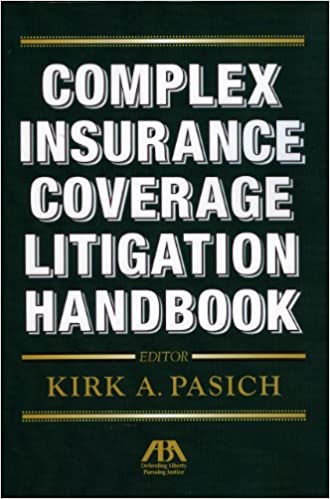The Complex Litigation Coverage Litigation Handbook1 provides a comprehensive procedural guide to litigating complex insurance coverage matters in a not-so-complex way. The book supplies an overview of various insurance policies, issues, and litigation tactics all the way through appeals. The book expanded upon a two-year effort by the American Bar Association Task Force in conjunction with the help of experienced insurance coverage litigation judges to create a definitive reference tool for insurers and policyholders involved in litigation. It’s a must read for anyone starting out a career in insurance litigation to the senior professional.
What I love most about the book is how it provides policyholder advocates with the guidance and resources needed to effectively litigate. The book takes the reader on journey through case management, discovery, motion practice, settlement, trial, and appeals. There is truly a wealth of knowledge for any policyholder advocate. Some of my favorite chapters of the book include discovery, settlement, and trial.
The book tackles issues of Discovery, citing the pull between parties in complex insurance coverage matters. As most insurance litigation attorneys know, written discovery requests are often extremely broad and comprehensive, seeking the production of hundreds—if not thousands—of pages of documents and answers to hundreds of interrogatories. The book suggests that both parties are more likely to gain a resolution when they make a meaningful attempt to reduce the weight of discovery and focus on areas that are most likely to bear some outcome of the case.
The book also delves into the pros and cons of various Alternative Dispute Resolution Techniques, which are often used as a means of resolving coverages disputes more efficiently.
Potential Advantages to Arbitration:
Time – Arbitration often, but not necessarily, can be completed faster than a dispute can be litigated. Typically the procedure is less formal than litigation. Arbitration is generally more cost effective than litigating a dispute in court. If the parties agree an arbitration can be conducted without any or only limited discover. This would greatly reduce the amount of attorneys’ fees the parties would incur. However, insurance disputes cannot be resolved without discovery. Arbitrations are also confidential. This could be beneficial to parties adversed to a public dispute. Nevertheless, arbitrations waive the right to jury and provide no right to an appeal. Most importantly, a party agreeing to arbitration usually agrees to not pursue Certain claims such as bad faith otherwise available if the party had proceeded to Litigation.
The Trial Management chapter of the book provides advice on effective trial management through organizational tools and tactics such as submitting jury instructions before the trial, preparing in advance for the use of computer technology at trial (something many attorneys mess up), and the importance of preparing closing arguments the day an attorney opens a case as an essential component to trial management.
This book helps defeat the myth that insurance coverage disputes are esoteric and complicated, and provides practical advice on how to approach each step of insurance coverage litigation, from beginning to end.
Thought of the day
Negotiation is not an act of battle; it’s a process of discovery. The goal is to uncover as much information as Possible.
Chris Voss, “Never Split the Difference”
_____________________________________
1 Complex Litigation Coverage Litigation Handbook. Kirk Pasich (Ed.), American Bar Association, 2011.





